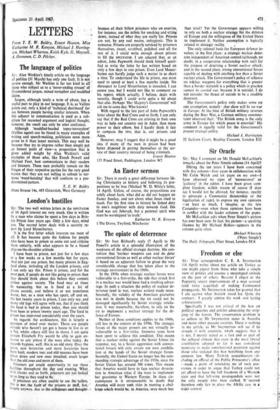The opiate of deterrence
Sir: Mr Ivor Richard's reply (7 April) to Mr Powell's article is a splendid illustration of the weakness of the official strategic doctrine. His con- tention that 'nuclear weapons can and do deter conventional forces as well as other nuclear forces' is based on an apparent failure to grasp the very considerable change that has taken place in the strategic environment in the 1960s.
In the 1950s when strategic nuclear forces were vulnerable to a first-strike, the side that struck first in a nuclear war would have had a crushing advan- tage. In such a situation the policy of nuclear de- terrence (and in war, nuclear action) made sense. Secondly, the validity of the American guarantee was not in doubt because the us could not be damaged significantly by Soviet strategic retalia- tion. It was reasonable, therefore, to rely on the us to implement a nuclear strategy for the de- fence of Europe.
Neither of these conditions applies to the 1960s, still less in the context of the 1970s. The strategic
forces of the major powers are not virtually in- vulnerable to a first-strike. Immense sums have been spent to achieve this condition. This means that a nuclear strike against the Soviet Union (in response, say, to a Soviet aggression with conven- tional forces) will only ensure our own annihila- tion at the hands of the Soviet strategic forces. Secondly, the United States no longer has the com- manding strategic advantage of the 1950s. since the Soviet Union has around 300 ICBMS. This means that America would have to face nuclear devasta- tion to American cities if she were to implement her guarantee to Western Europe. In these cir- cumstances is it unreasonable to doubt that America will incur such risks in meeting a chal- lenge which would be. to America, wry much less
than total? Yet the Government appears willing to rely on both a nuclear strategy for the defence of Europe and the willingness of the United States to implement it. Neither assumption is logically related to strategic reality.
The only rational basis for European defence in- volves, in the first place: a strategic nuclear deter- rent independent of American control (although, no doubt, in a cooperative relationship with sac) for the purpose of deterring a Soviet nuclear attack; and in the second place, strong conventional forces capable of dealing with anything less than a Soviet nuclear attack. The Government's policy of reliance on nuclear weapons for everything that is greater than a border skirmish is a policy which in practice cannot be carried out, because it is suicidal. I do not consider the threat of suicide to be a credible deterrent.
The Government's policy only makes sense on one assumption, namely: that there will be no war in Europe. At the time of British military reverses during the Boer War, a German military commen- tator observed that: 'The British army is the only army in Europe for which peace is essential.' His comment is equally valid for the Government's present strategic policy.
Michael I. Harrington
32 Jackson Court, Brading Crescent, London Ell






































 Previous page
Previous page